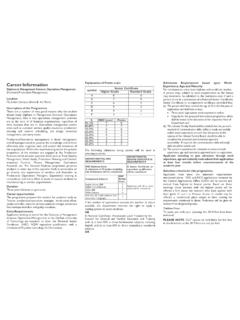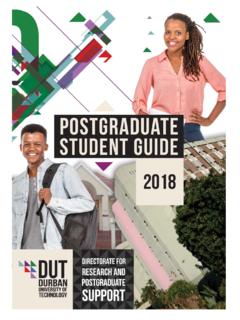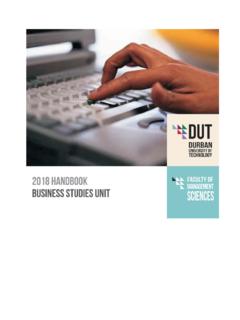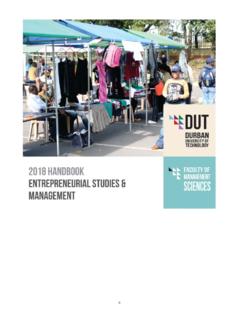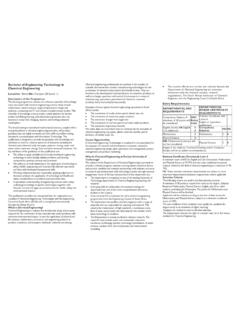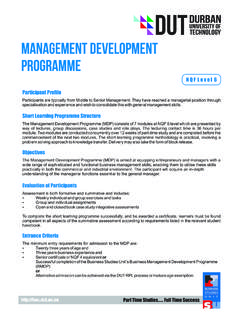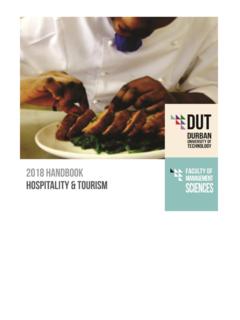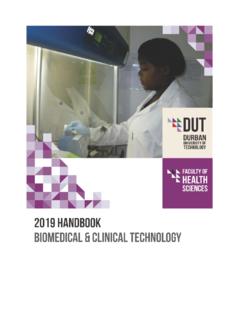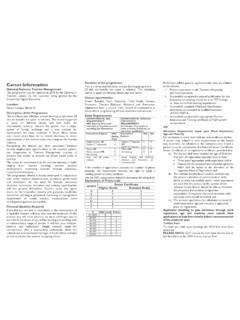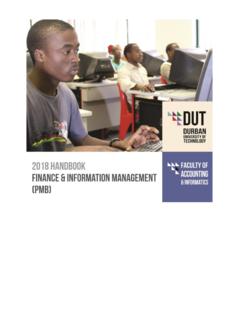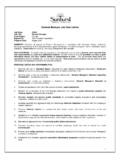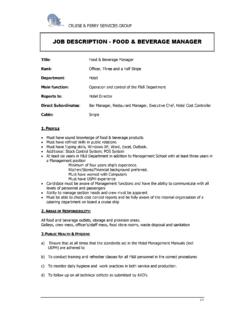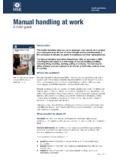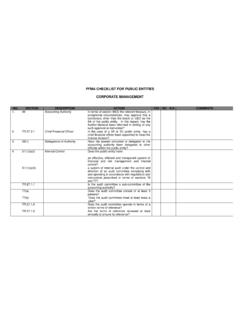Transcription of HANDBOOK FOR 2018 - Durban University of Technology
1 HANDBOOK FOR 2018 FACULTY of MANAGEMENT SCIENCES DEPARTMENT of operations & QUALITY MANAGEMENT DEPARTMENTAL MISSION To provide a quality service to learners at both undergraduate and post graduate level, through formally accredited programmes, in the field of operations , Production and Quality Management. The Department is committed to producing self-motivated, independent thinking and professional graduates in these fields What is a University of Technology ? A University of Technology is characterized by being research informed rather than research driven where the focus is on strategic and applied research that can be translated into professional practice. Furthermore, research output is commercialized thus providing a source of income for the institution. Learning programmes, in which the emphasis on technological capability is as important as cognitive skills, are developed around graduate profiles as defined by industry and the professions.
2 CONTENTS Page 1. CONTACT DETAILS 1 2. STAFFING 2 3. PROGRAMMES OFFERED BY THE DEPARTMENT 3 4. PROGRAMME INFORMATION AND RULES 3 5. PROGRAMME STRUCTURE 6 6. ASSESSMENT RULES 7 7. RE-REGISTRATION RULES 7 8. SUBJECT CONTENT 12 IMPORTANT NOTICE The departmental rules in this HANDBOOK must be read in conjunction with the University of Technology s General Rules contained in the current General HANDBOOK for Students. NOTE TO ALL REGISTERED STUDENTS Your registration is in accordance with all current rules of the Institution. If, for whatever reason, you do not register consecutively for every year/semester of your programme, your existing registration contract with the Institution will cease. Your re-registration anytime thereafter will be at the discretion of the Institution and, if permitted, will be in accordance with the rules applicable at that time.
3 - 1 - 1. CONTACT DETAILS All departmental queries to: Secretary: Mrs. K. Chellan Tel No: 031-3735158 Fax No: 031-3735337 Location of Department: B Block, 1st floor, ML Sultan Campus All Student registration queries to: Faculty officer: R. Pankhurst Tel No: 031-3735441 Location of Faculty office: A-Block, 1st Floor, ML Sultan Campus Executive Dean: Prof R Balkaran Tel No: 031-3735130 Fax No: 031-3735333 Location of Executive Dean s office: A-Block, 1st Floor, ML Sultan Campus - 2 - 2. STAFFING Name and Qualification Head of Department R. Ramlagan (MTech: Quality) Senior Lecturers Mr. R. Naidoo (MTech: Production Management) S. Singh (DTech: Quality) Lecturers Mr. R. Moodaliyar (MTech: Quality) Dr. M. Ramchunder ( ) Ms. N. Nogaya (Mtech: Quality) Mrs.
4 P. Ximba (MBA) Part Time Dr. S. Seethal (PhD) Mrs. S. Mohanram (BTech: Production Management) Mr. M. Osman (BTech: operations Management) Mr. A. Dabechuran (MBA) Ms. L. Mtunzi (MBA) Mr A Inderlall (M-Tech; Quality) Mr D. Singh (Msc) Mr M. Mdubeki (MBA) - 3 - 3. PROGRAMMES OFFERED BY THE DEPARTMENT Programmes are offered in this Department which, upon successful completion, lead to the award of the following qualifications: Qualification Diploma in Management Sciences ( operations Management) SAQA NLRD ID. 94830 National Diploma: operations Management (Phasing out in 2016) Bachelor of Technology in operations Management (Phasing out in 2018 ) Bachelor of Technology in Quality (Phasing out in 2018 ) Master of philosophy in Quality Management Doctor of Philosophy in Quality Management The following programmes are being phased out and there will be no new first year in take in 2016 ND: operations Management The B-Tech operations and B-Tech: Quality will be phasing out and the Advanced Diploma and Post Graduate Diploma is to be introduced in 2019.
5 4. PROGRAMME INFORMATION The department offers the Diploma on a full time and part time basis. Both the B-Tech programmes are offered on a part time basis. The master of philosophy in Quality Management and Doctor of Philosophy in Quality Management. are offered on a part-time basis. The full-time instructional programmes are offered to students between 08:00 and 16:50 daily. For those who are employed, a part-time lecture programme is arranged between the hours of 17:00 and 20:00. Tutorial programme is available to full time and part time students. Tutorials for part time students are scheduled on Saturdays to accommodate students that work in the evenings after 19h00pm. The programme content, final examinations and diploma issued are the same for both groups. The Diploma in Management Sciences ( operations Management) has been developed to produce competent graduates who are grounded in the fundamental theory and principles that underlie the practice and growth in this field.
6 This 360 credit diploma is at a NQF level 6 and is aligned with the qualification description as per the HEQF. In keeping with the institution s aims of creating, maintaining and developing its relationships with commerce, government and industry, this diploma seeks to further strengthen the link between the institution and the world of work. The learning environment is flexible in both its mode of delivery and its methodologies, with a combination of formal face-to-face classes, Technology based and independent learning contributing to the learners experience Diploma: Management Sciences ( operations Management) See General Rules G21B See General Rules G7 - 4 - Entrance requirements for the new qualifications are as follows: Applicants wishing to enrol for the Diploma: Management Science ( operations Management) at the Durban University of Technology are required to have current matric National Senior Certificate (NSC)/NQF4 equivalent qualification, with a minimum of 25 points excluding Life Orientation.
7 Explanation of Points scale: Symbol Senior Certificate Higher Grade(HG) Standard Grade (SG) A 8 6 B 7 5 C 6 4 D 5 3 E 4 2 F 3 1 NSC Level Points 90-100% 7 8 80-89% 7 7 70-79% 6 6 60-69% 5 5 50-59% 4 4 40-49% 3 3 30-39% 2 2 0-29% 1 1 The following admission rating system will be used in selecting students: NSC Requirements NSC Rating Code Senior Certificate requirements Compulsory Subjects Applicants with 20 points or more holding a senior certificate or equivalent qualification will be considered. English (home) OR English (1st additional) 3 4 Mathematics OR Mathematics Literacy 3 4 And two (2) 20 credit subjects (not more than one language) 3 - 5 - Or A National Certificate (Vocational) Level 4 issued by the Council for General and Further Education and Training with a) at least 50% in three fundamental subjects, including English; and b) at least 60% in three compulsory vocational subjects Or An access pathway for mature students (older than 23 years with a minimum of 3 years work experience in a related field) will be provided.
8 Leaners may also be granted access to the qualification through DUT s Recognition of Prior Learning (RPL) process. Selection criteria for this programme. Applicants must meet the minimum requirements mentioned in above. NSC and NCV applications received via the Central Applications Office (CAO) will be scored and ranked from highest to lowest points. Based on these rankings, those learners with the highest points will be offered a firm place, the learners who have applied with their grade 11 results may be offered a conditional place subject to them meeting the requirements in above. Registration All courses offered are semester and registration takes place during January and July. Admission to first year of study is in January. See General Rules G3, G4, G5, G6 and G7. The last date for acceptance of late enrolments or transfers from other departments will be four weeks from the commencement of lectures.
9 Applications by students wishing to transfer from other institutions/courses will be considered on an individual basis and may be accepted into the first year of the Diploma in Management Sciences ( operations Management) Changing from old programme to new programme The operations Management will be phased out and students who have not completed the outstanding subjects in terms of the phase out plan, may either transfer to the new qualification, or may complete the outstanding subjects at another institution and may apply for exemption, subject to the provision of the general rules. Students transferring from the incomplete National Diploma operations Management to the Diploma in Management Sciences ( operations Management) may, on application, be granted credit for subjects passed towards the new qualification.
10 - 6 - Exemptions and transfers Students will be able to carry credits from the ND: operations Management to the new qualification within a four year period. See General Rules G8 and G9. Work done during the year 1. Year marks/course marks shall be determined in accordance with the requirements as indicated in the learner guides. For details of assessment refer to the learner guide pertaining to each subject. Failure to meet these requirements will disqualify a student from writing the final examination in the subject concerned. 2. Notwithstanding Rule G12 a year/semester mark obtained for any subject is valid only for the main examination in the year/semester in which a student is registered plus the supplementary examination in that subject if granted to the student in terms of Rule G13. 3. Students must verify course marks before the final examinations are written.
